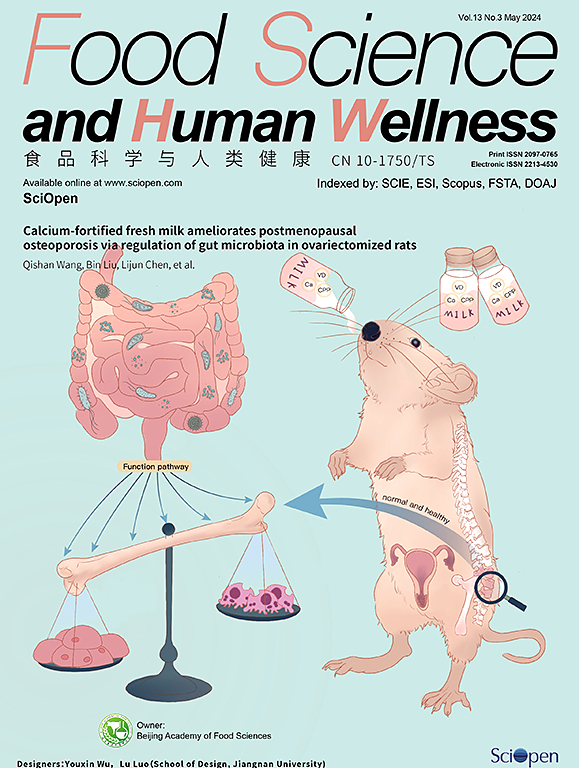Diet with high content of advanced glycation end products induces oxidative stress damage and systemic inflammation in experimental mice: protective effect of peanut skin procyanidins
IF 7.4
1区 农林科学
Q1 FOOD SCIENCE & TECHNOLOGY
引用次数: 0
Abstract
Non-enzymatic glycation reaction in food can produce diet-derived advanced glycation end products (dAGEs), which have potential health risks. Thus, it is of great significance to find efficient substances to improve the negative effects induced by dAGEs on human health. This study investigated the intervening effects of peanut skin procyanidins (PSP) on the dAGEs-induced oxidative stress and systemic inflammation in experimental mice model. Results showed that the accumulation of AGEs in serum, liver, and kidney was significantly increased after mice were fed dAGEs (P < 0.05). The expression of advanced glycation product receptor (RAGE) was also significantly increased in liver and kidney (P < 0.05). PSP could not only effectively reduce the accumulation of AGEs in serum, liver and kidney of mice, but also reduce the expression of RAGE in liver and kidney of mice. And the levels of pro-inflammatory cytokines interleukin-6 (IL-6), tumor necrosis factor (TNF-α) and IL-1β in serum of mice were significantly decreased (P < 0.05), while the levels of anti-inflammatory factor IL-10 were increased, and the inflammatory injury in mice was improved. In addition, the levels of superoxide dismutase (SOD), glutathione (GSH), catalase (CAT) in liver and kidney of mice were increased (P < 0.05), and the level of malondialdehyde (MDA) was decreased (P < 0.05), which enhanced the antioxidant capacity of mice in vivo, and improved the oxidative damage of liver and kidney. Molecular docking technique was used to confirm that the parent compound of procyanidins and its main metabolites, such as 3-hydroxyphenylacetic acid, could interact with RAGE, which might inhibit the activation of nuclear transcription factor (NF-κB), and ultimately reduce oxidative stress and inflammation in mice.

高级糖化终产物含量高的饮食会诱发实验小鼠的氧化应激损伤和全身炎症:花生皮原花青素的保护作用
食品中的非酶糖基化反应可产生饮食源性晚期糖基化终产物,具有潜在的健康风险。因此,寻找有效的物质来改善ages对人体健康的负面影响具有重要意义。本研究探讨花生皮原花青素(PSP)对dags诱导的小鼠氧化应激和全身炎症的干预作用。结果表明,灌胃age后,小鼠血清、肝脏和肾脏中AGEs的积累显著增加(P <;0.05)。晚期糖基化产物受体(RAGE)在肝脏和肾脏中的表达也显著升高(P <;0.05)。PSP不仅能有效降低小鼠血清、肝脏和肾脏中AGEs的积累,还能降低小鼠肝脏和肾脏中RAGE的表达。小鼠血清中促炎细胞因子白介素-6 (IL-6)、肿瘤坏死因子(TNF-α)、IL-1β水平显著降低(P <;0.05),抗炎因子IL-10水平升高,小鼠炎症损伤得到改善。此外,小鼠肝脏和肾脏中超氧化物歧化酶(SOD)、谷胱甘肽(GSH)、过氧化氢酶(CAT)水平升高(P <;0.05),丙二醛(MDA)水平降低(P <;0.05),提高了小鼠体内抗氧化能力,改善了肝脏和肾脏的氧化损伤。通过分子对接技术证实原花青素的母体化合物及其主要代谢物3-羟基苯基乙酸可与RAGE相互作用,抑制核转录因子(NF-κB)的激活,最终减轻小鼠的氧化应激和炎症反应。
本文章由计算机程序翻译,如有差异,请以英文原文为准。
求助全文
约1分钟内获得全文
求助全文
来源期刊

Food Science and Human Wellness
Agricultural and Biological Sciences-Food Science
CiteScore
8.30
自引率
5.70%
发文量
80
审稿时长
28 days
期刊介绍:
Food Science and Human Wellness is an international peer-reviewed journal that provides a forum for the dissemination of the latest scientific results in food science, nutriology, immunology and cross-field research. Articles must present information that is novel, has high impact and interest, and is of high scientific quality. By their effort, it has been developed to promote the public awareness on diet, advocate healthy diet, reduce the harm caused by unreasonable dietary habit, and directs healthy food development for food industrial producers.
 求助内容:
求助内容: 应助结果提醒方式:
应助结果提醒方式:


